Select Language
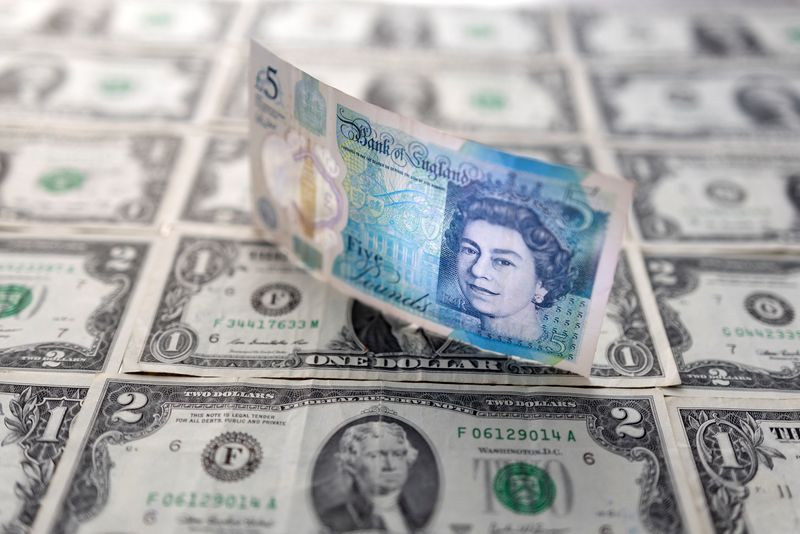
By Ankur Banerjee and Sameer Manekar
SINGAPORE (Reuters) - The U.S. dollar was hovering near three-week lows on Friday ahead of payrolls data that will likely influence the outlook for rates, while the pound was firm as the Labour party looked set to win a massive majority in the UK general election.
Sterling was last at $1.27575, little changed in early trading and not far off a three-week high of $1.27765 touched on Wednesday.
It is up 0.9% for the week, its best weekly performance since mid-May and remains the strongest-performing major currency against the dollar this year with a gain of 1.2%.
Centre-left Labour was on course to capture 410 of the 650 seats in parliament, a majority of 170 seats and affording investors some much-needed certainty after years of market volatility under the Conservatives.
"I don’t expect a new government to lead with a dramatic policy move any time soon, they will have learnt from mistakes of the past," Orla Garvey, senior portfolio manager for fixed income at Federated Hermes (NYSE:FHI).
"This pushes the risks associated with the UK election a little further down the line."
The euro was little changed at $1.0816 as traders refrained from making major bets with France gearing up for the run-off election on Sunday. Polls suggest the far-right National Rally (RN) is likely to fall short of a majority.
The single currency, which has been under pressure since French elections were called in June, is up nearly 1% for the week and on track for its strongest weekly performance of the year.
While worries that RN could gain a majority and introduce big spending increases have receded, the country is headed for a hung parliament which is likely to weigh on sentiment, analysts said.
"It’s hard to see a dynamic where any fiscal measures of substance are passed in France," said Chris Weston, head of research at Pepperstone.
U.S. traders return from their July 4th holiday and the spotlight will firmly be on non-farm payrolls, due later on Friday. The report is expected to show an increase of 190,000 jobs in June after a rise of 272,000 in May, according to a Reuters poll of economists.
A slew of economic data showing a cooling U.S. economy has heightened expectations the data-sensitive Federal Reserve will cut rates sometime soon. Traders are pricing in a 73% chance of a cut in September, according to the CME FedWatch tool.
Markets are also pricing in potentially two rate cuts this year, although the Fed last month forecast just one rate cut for 2024. Much will depend on upcoming data.
"A softer (payrolls) print should further boost rate cut expectations and add to USD downside," said Christopher Wong, an FX strategist at OCBC.
The dollar index, which measures the U.S. currency against six rivals, was down 0.1% at 105.05, close to its lowest point since mid-June.
The yen was 0.16% higher, up for a second straight day - something that hasn't happened since the start of June. It last fetched $161.095 per dollar, crawling slowly away from the 38-year low of 161.96 on Wednesday.
Traders have been wary of Japanese authorities intervening in the market to prop up the currency which has lost more than 12% against the dollar this year, weighed down by the wide interest rate difference between Japan and the United States.
Tokyo spent some 9.8 trillion yen in late April and early May to intervene in the currency market when the yen hit a then 34-year low of 160.245 per dollar. Analysts say, however, that authorities will focus on the pace of yen weakening and not just the levels.
In other currencies, the Australian dollar rose 0.16% to $0.6736, hovering near six-month highs, while the New Zealand dollar stood at $0.6121. [AUD/]
Bitcoin fell 2% to $57,088, just shy of the two month low it hit on Thursday.
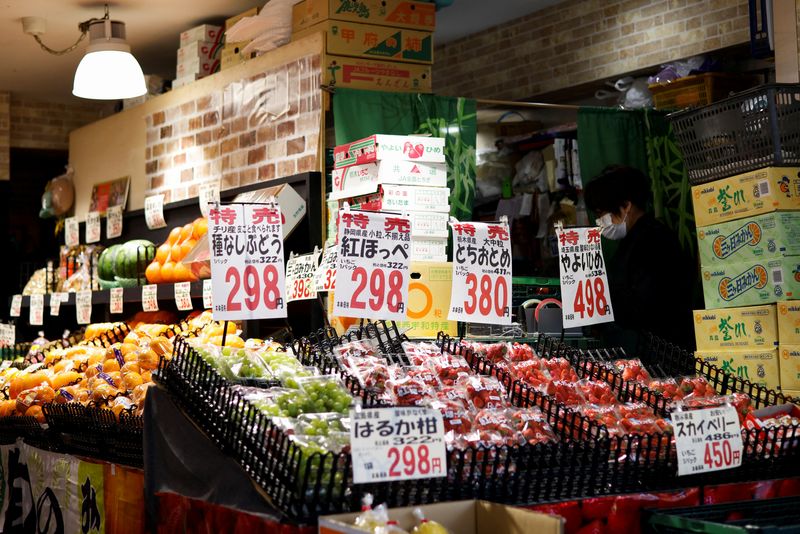
By Satoshi Sugiyama and Leika Kihara
TOKYO (Reuters) -Japanese household spending unexpectedly fell in May, government data showed on Friday, as higher prices continued to squeeze consumers' purchasing power, further threatening the fragile economy.
Consumer spending contracted 1.8% in May from a year earlier, far short of the median market forecast for a 0.1% uptick, as rising food prices weighed on spending for other items.
Consumption is among key factors the Bank of Japan (BOJ) is scrutinising to gauge the strength of Japan's economy and decide how soon to raise interest rates.
The weaker yen weighed on spending, including pushing down demand for overseas package tours, a government official told reporters at a briefing.
On a seasonally adjusted, month-on-month basis, spending decreased 0.3% versus an estimated 0.5% rise.
Sluggish private consumption is a source of concern for policymakers striving to achieve sustained economic growth underpinned by solid wages and durable inflation, which are prerequisites for normalising monetary policy.
BOJ Governor Kazuo Ueda has said he expects consumption to recover as big wage hikes offered by many Japanese companies, and government subsidies to curb electricity bills, prop up household income.
"I still think consumer spending is on a recovery trend in April-June, given rising wages and income tax cuts that kicked in from June," said Atsushi Takeda, chief economist at Itochu Economic Research Institute, adding that he expects the BOJ to raise interest rates in September.
The Japanese economy shrank more than initially reported in the January-March quarter, the government said earlier this week, in a rare, unscheduled revision to gross domestic product (GDP) data.
Economists, though, expect GDP to rebound this quarter thanks to higher wages and capital spending driving up domestic demand. A survey conducted by Japan's largest trade union group showed workers' monthly pay will rise 5.10% on average this fiscal year, the biggest hike in three decades.
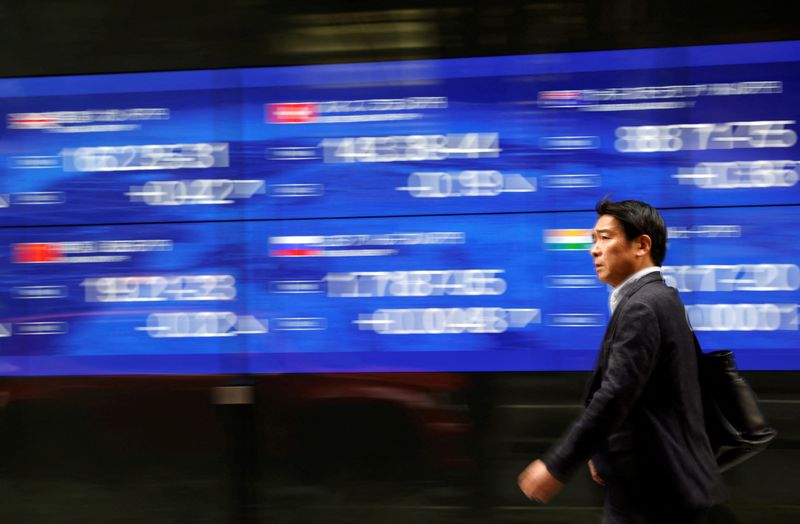
LONDON (Reuters) - World stocks clocked up more record highs on Thursday after U.S. data narrowed the odds on a September Fed interest rate cut, while Europe was on politics watch again as UK voters headed to the polls in national elections.
The July 4 holiday in the United States made for thin trading, amplified as investors sat on their hands to see just how large a majority the Labour Party might get when the UK's election exit poll and results start coming out around 2100 GMT.
Markets are well prepared for a change given opinion polls have for months put the centre-left party on course for a landslide victory over the Conservatives, who have held power for 14 years through both Brexit and the COVID-19 pandemic.
"Having been very negative of sterling for a very long time, institutional investors are actually going into this election quite neutral," said Michael Metcalfe, head of macro strategy at State Street (NYSE:STT) Global Markets.
That is partly, he said, because political risk has surged in the likes of France, which holds the second round of its parliamentary elections in three days' time, and in the United States ahead of its Presidential vote in November.
"The UK, oddly, has ended up with a neutral position in the middle," Metcalfe said. "Also, I don't think at any point has the result (of the election) been in any doubt."
UK polling stations opened at 0600 GMT and by lunchtime London's FTSE 100 early 0.6% rise had extended to almost 1%, while sterling had crept up to $1.2760 and 84.6 pence per euro leaving it up almost 4% and 2.2% on the respective currencies since April. [/FRX]
Additional tailwinds for the FTSE came from MSCI's main global index, which notched up its latest record high after Wall Street's S&P 500 and Nasdaq had done the same ahead of the July 4 celebrations.
Across the English Channel from Britain, polls in France suggested National Rally (RN) would not win a majority of seats in Sunday's second round of Parliamentary election as mainstream parties moved to block the far right.
France's bond yields, which move inversely to price and are a proxy for government borrowing costs, still edged higher though as the country's treasury sold 10.5 billion euros ($11.3 billion) worth of bonds into the market, although it was a welcome sign that it all went smoothly. [GVD/EUR]
French bond "spreads have been tightening and sentiment has been a bit more positive," said Jussi Hiljanen, head of rates strategy at lender SEB.
A hung parliament appears the most likely result in the French elections, as left and centrist groups strike deals to try to keep Marine Le Pen's National Rally from power.
HOT CHIPS
Car shares were on the move again as the European Union said it plans to impose tariffs of between 17.4% and 37.6% on Chinese electric vehicle makers like BYD (SZ:002594), Geely and SAIC.
There is however a four-month window during which talks are expected to continue with Beijing, which has unsurprisingly threatened to retaliate.
The bulls were still charged up though after chipmaker Nvidia (NASDAQ:NVDA) started Wall Street's July 4 celebrations early by adding another 4.5% to what is now a near 160% leap in it shares this year. [.N]
Asia then closed up nearly 1% overnight to reach its highest since April 2022, as Japan's Nikkei finished within spitting distance of its March peak (T) and Taiwan's main index also struck a record as Taiwan Semiconductor Manufacturing Co (TSMC) cleared T$1,000 for the first time.
The U.S. ISM measure of services activity surprised by sliding to its lowest since mid-2020, with employment notably weak ahead of the June payrolls report due on Friday.
Analysts cautioned the series was contradicted by strength in the PMI survey of services, but did note that price measures in both surveys pointed to easing inflation.
EYES ON THE SURPRISE
A run of subdued data mean Citi's U.S. economic surprise index has sunk to -47.5, the lowest since August 2022. Meanwhile, the closely watched Atlanta Fed's GDPNow estimate fell to just 1.5% from 1.7%.
That should be music to the ears of the Federal Reserve, with minutes of its last meeting showing committee members wanted more evidence of a cooling economy before cutting rates.
At the time of that meeting, the GDPNow growth estimate was running around 3% annualised.
"Reading through the minutes from only three weeks ago, it is a good reminder of how quickly the activity outlook has deteriorated," said Paul Ashworth, chief North America economist at Capital Economics.
"Given the more encouraging personal consumption expenditure data in May, the risk of a reacceleration in inflation seems even less likely, particularly with GDP growth now running well below its potential," he added. "We still think that the Fed will begin to cut interest rates this September."
Markets quickly lifted the probability of a September rate cut to 74%, from 65%, while pricing in 47 basis points of easing for this year.
With the U.S. economy now seemingly less exceptional, the dollar dropped across the board. The euro was up at $1.0797, and away from its recent low of $1.0666, while the dollar index hit its lowest in three weeks. [USD/]
The Australian dollar was a notable gainer, touching a six-month peak of $0.6733 at one point with markets wagering the next move in local rates could be higher.
The yen remained out in the cold, hitting multi-year lows on a host of currencies as investors continued to favour carry trades. The dollar stood at 161.11 yen after striking a 38-year top of 161.96 on Wednesday.
The drop in the dollar was a boon for commodities, with gold rallying to $2,358 an ounce, from $2,318 at the start of the week. [GOL/]
Oil prices eased a touch, having gained the previous day when a surprisingly large decline in U.S. crude stocks pointed to firmer demand as the U.S. driving season gets underway. [O/R]
Brent dipped 43 cents to $86.93 a barrel, while U.S. crude fell 54 cents to $83.03 per barrel.
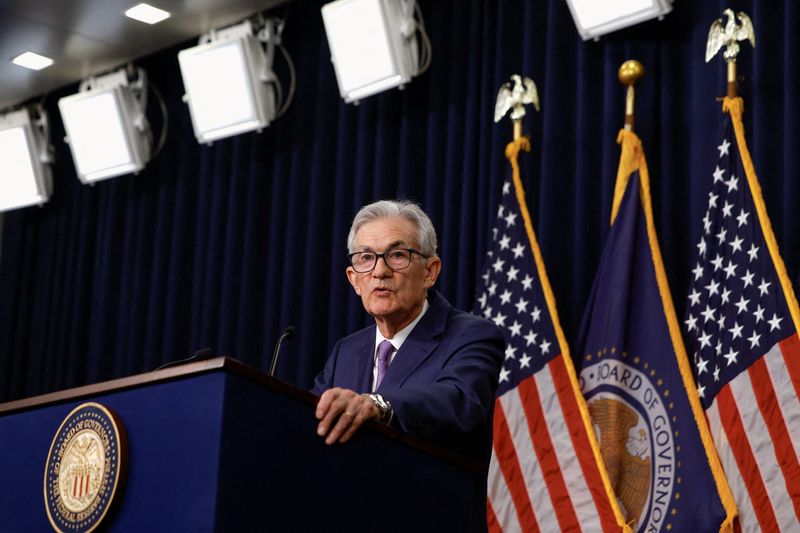
A look at the day ahead in European and global markets from Ankur Banerjee
It was a risk-on session in Asia, with European bourses poised for a similar start in the wake of comments by Fed Chair Powell, with investors buoyed by reinforced expectations that rate cuts are just around the corner in the U.S.
The fallout of the French election will remain in the spotlight as opponents of France's National Rally stepped up their bid to block the far-right party from power in Sunday's run-off election.
The euro, which lurched to a two-week high on Monday after RN did not score an outright majority, was steady at $1.074475, while futures indicated the pan-European STOXX 600 index could move away from the two-month low it touched on Tuesday.
Powell stating that the U.S. is back on a "disinflationary path" was enough to put the dollar on the defensive, with Treasury yields lower even though he cautioned that more data is needed before policymakers could consider cutting rates.
""We just want to understand that the levels that we're seeing are a true reading on what is actually happening with underlying inflation," Powell said at a conference in Portugal sponsored by the European Central Bank.
So, the Fed is still data-dependent, making the next few inflation readings crucial in dictating where U.S. rates are headed by the end of the year. Traders are clinging to as much as two rate cuts this year from the Fed.
Minutes from the Fed's June meeting are due later in the day and could offer clues on the central bank's thinking on U.S. rates.
Meanwhile, the ECB remains in no hurry to lower borrowing costs further after cutting rates last month, with data on Tuesday showing the crucial services component in euro zone inflation staying stubbornly high.
The ECB's Christine Lagarde and Philip Lane are due to take the stage in Portugal and may have comments that could swing the markets on rate expectations. Traders are currently pricing in 43 basis points of cuts this year from the ECB.
In corporate news, Tesla (NASDAQ:TSLA) reported on Tuesday a smaller-than-expected 5% drop in vehicle deliveries in the second quarter, as the electric car maker's price cuts and incentives helped mitigate cooling demand. Although EV makers, not just Tesla, still face a bumpy road ahead.
Key developments that could influence markets on Wednesday:
Economic events: June PMI for France, German, UK and euro zone
Speakers: Fed's John Williams, ECB's Christine Lagarde and Philip Lane at ECB forum in Portugal
(By Ankur Banerjee in Singapore; Editing by Muralikumar Anantharaman)
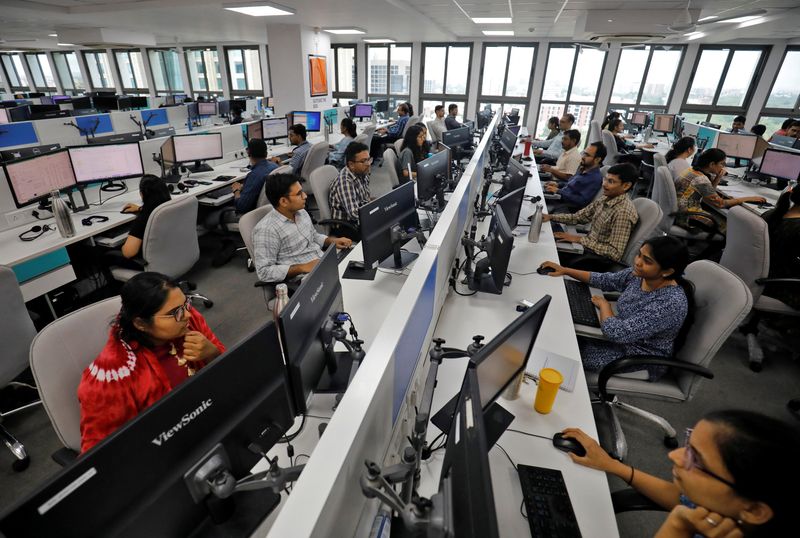
By Anant Chandak
BENGALURU (Reuters) - Growth in India's dominant services industry accelerated last month, buoyed by strong demand and a record rise in export orders, according to a business survey that also showed companies were hiring at the fastest in nearly two years.
HSBC's India Services Purchasing Managers' Index, compiled by S&P Global, rose to 60.5 in June from 60.2 in May, close to a Reuters poll median forecast of 60.6 and a preliminary reading of 60.4.
It has been above 50, which separates growth from contraction, for nearly three years.
"Activity growth in India’s service sector accelerated in June ... led by an increase in both domestic and international new orders," noted Pranjul Bhandari, chief India economist at HSBC.
New business - a key gauge of demand - has been above breakeven since August 2021 and expanded at a faster pace last month. That was supported by the fastest rise in international orders since the sub-index was added to the survey nearly a decade ago.
That is good news for India's economic outlook, already the seventh largest services exporting country globally, according to the Reserve Bank of India.
Asia's third-largest economy posted faster-than-expected growth of 7.8% in January-March quarter but was expected to slow modestly this fiscal year, a Reuters poll found.
Strong demand encouraged service providers to recruit more staff. The pace of job creation was the strongest since August 2022, taking the current stretch of growth in hiring to over two years.
However, overall positive sentiment for the coming year slipped to an 11-month low due to concerns surrounding market uncertainty and competition.
"Overall, service providers remain confident about the year-ahead business outlook, although the level of optimism moderated sharply during the month," added Bhandari.
Meanwhile, costs rose at the slowest pace in four months, indicating cooling inflation, and the report said fewer than 5% of firms surveyed opted to pass cost burdens to clients, resulting in only a moderate rate of charge inflation.
The Reuters poll found inflation would likely fall below the mid-point of the RBI's medium-term target of 4% this quarter, but then pick up in the next one. Yet, the central bank was expected to cut interest rates to 6.25% towards year-end.
A rise in both manufacturing and services pushed up the overall HSBC India Composite PMI to 60.9 last month, matching the flash estimate, from 60.5 in May.

By Ankur Banerjee
SINGAPORE (Reuters) - Asian stocks rose on Wednesday as comments from Fed Chair Jerome Powell reinforced expectations that U.S. rate cuts were not far off, while the yen remained pinned near levels last seen in 1986, keeping traders wary of Japanese intervention.
MSCI's broadest index of Asia-Pacific shares outside Japan was 0.26% higher, while Japan's Nikkei rose 0.49%, stalking the record high touched in March.
The U.S. is back on a "disinflationary path", Powell said on Tuesday, although he cautioned that policymakers need more data before they can consider cutting interest rates.
Powell's comments sent U.S Treasury yields 4.3 basis points lower overnight, with the yield on the 10-year note steady at 4.433% in Asian hours on Wednesday, keeping the dollar subdued. Investors were also weighing data showing a tight U.S. labour market.
Michael Brown, senior research strategist at Pepperstone, said Powell's remarks sounded, at the margin, just a touch more dovish than those made as of late.
"Commentary of this ilk appears to further open the door to a September rate cut, especially with Powell also flagging the risk associated with leaving it too late to deliver the first rate reduction."
Traders are currently pricing in a 69% chance of the Fed cutting rates in September and as many as two rate cuts this year, a far cry from the over 150 basis points of easing expected at the start of the year.
Chinese stocks fell in early trading, with the blue-chip CSI 300 index down 0.27%. Hong Kong's Hang Seng was 0.3% higher.

(Corrects confidence milestone in paragraph 1 to four-year (not four-month))
BEIJING (Reuters) -China's services activity expanded at the slowest pace in eight months and confidence hit a four-year low in June, dragged by slower growth in new orders, a private-sector survey showed on Wednesday, suggesting more economic stimulus is needed.
The Caixin/S&P Global services purchasing managers' index (PMI) eased to 51.2 from 54.0 in May, marking the lowest reading since October 2023 but remaining in expansionary territory for the 18th straight month. The 50-mark separates expansion from contraction.
The survey, which covers mostly private and export-oriented companies, aligned with a broader official PMI released on Sunday that showed activity in the services sector plumbed a five-month low.
The world's second-largest economy has reported patchy growth in recent months, reinforcing calls for more policy support to achieve an ambitious growth target of around 5%.
The new orders subindex fell to 52.1 in June from 55.4 the previous month. Overseas demand also eased slightly even on top of strong exports in May.
Business confidence levels eased to the lowest level since March 2020 with concerns about the global economy and rising competition.
Service providers were scaling back hiring again last month after adding employment in May.
But slower rates of inflation for both input and output prices offered a respite to business owners who were grappling with higher input material, labour and transport costs.
The Caixin/S&P's composite PMI, which tracks both the services and manufacturing sectors, fell to 52.8 from 54.1.
Markets are now focused on a leadership gathering in the middle of July, known as the third plenum, which may announce some reforms.
Measures that redistribute income from central authorities to local governments, thus reducing their reliance on land sales, will top the agenda of the gathering, according to policy advisers.
"Fiscal and tax reforms should focus on creating more optimistic expectations among market participants," said Wang Zhe, senior economist at Caixin Insight Group.
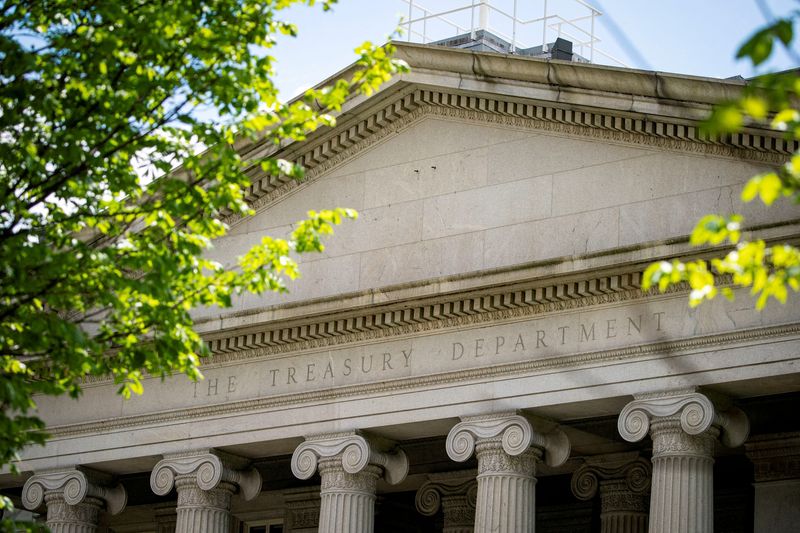
By Davide Barbuscia
NEW YORK (Reuters) - A measure of the borrowing costs on loans between banks and other participants in the U.S. repurchase agreement (repo) market hit its highest level since January on Monday, New York Federal Reserve data released on Tuesday showed.
The Secured Overnight Financing Rate (SOFR), a measure of the cost of borrowing cash overnight collateralized by Treasury securities, hit 5.4%, the highest since Jan. 2, in a sign of dwindling liquidity.
The jump from 5.33% at the end of last week follows heavy Treasury coupon debt supply, with the settlement of Treasury auctions straining banks' balance sheets, analysts said.
"SOFR should normalize in the coming days, as the supply gets digested," said Teresa Ho, head of U.S. short duration strategy at JPMorgan.
"However, it might take a little bit longer to normalize, not only because primary dealer inventories are already high, but also because it’s a holiday shortened week, providing less liquidity to the markets," she said.
A spike in the price for repurchase agreements, or repos, can be a sign that cash is getting scarce in a key funding market for Wall Street. Short-term funding costs spiked in September 2019, forcing the Federal Reserve to intervene by injecting liquidity into repo markets.
"Everyone's keeping a close eye on it because it is reminiscent of what happened in 2019," said Gennadiy Goldberg, head of U.S. rates strategy at TD Securities USA.
The jump in funding rates roughly coincided with an increase in usage of the Federal Reserve Bank of New York's reverse repo facility, through which money market funds lend to the Fed.
The facility last week saw $664.6 billion in inflows, the highest level since $680 billion on Jan. 10.
Such increases tend to happen around the end of the quarter as dealers offer less intermediation for regulatory reasons, prompting market participants to park their cash at the Fed.
"Around quarter end is when you typically have a pullback in balance sheet availability because a lot of the banks are looking to de-risk heading into quarter end," said Goldberg.
"You're starting to see more of an impact now that liquidity is not as ample as it used to be," he said.

By Balazs Koranyi
SINTRA, Portugal (Reuters) - The European Central Bank's next interest rate cut is still a relatively easy decision, but subsequent moves should only come once inflation is clearly heading towards the 2% target, ECB policymaker Pierre Wunsch said in an interview.
The ECB cut rates in early June but made no commitment about any further moves, arguing inflation was still too high and it lacked the confidence that 2% was within reach.
Wunsch already said at the time that the first two cuts were easy decisions and continues to maintain this view despite more recent figures showing stubborn wages and services price growth.
"If we have no major negative surprises, then based on our forecasts, I would say there is room for a second cut," Wunsch, Belgium's central bank governor told Reuters on Monday. "A small deviation from the projections would not change this view dramatically."
But even this second cut was not urgent, he said, and the ECB could wait until its next projections are due out in September.
"There is probably a premium in waiting for a meeting with new forecasts that confirm the picture but I would not make that a condition," Wunsch said.
Inflation is expected to have slowed to 2.5% last month from 2.6% in May, but the ECB sees a "bumpy" path ahead with figures oscillating around current levels for the rest of the year.
This could make it hard to cut again until figures start showing a more decisive move towards 2%.
"To continue with cuts, I would need to have some more comfort that we really are going down from 2.5% inflation to something which is closer to 2%," Wunsch said. "Do you want to go below 1% real spot rates? That's where it becomes a little bit more difficult for me."
The ECB's deposit rate stands at 3.75% and markets are betting on about 40 basis points of cuts over the rest of the year, or between one and two moves, and also see a total of four cuts in the next 18 months.
While economic growth is rebounding modestly and markets are relatively calm, a first round election victory by the far right in France complicates the picture. Wunsch said more political turbulence is possible given several countries need painful fiscal adjustments after years of excessive spending.
"In Europe as a whole, we now have five countries in excessive deficit procedures," he said. "It's not going to be easy in any of those five countries. I was never expecting that reducing these deficits will be easy."
But he also played down any talk the ECB could activate an emergency bond purchase scheme in case political stress reverberated in financial markets.
ECB officials have said markets moves need to be unwarranted and disorderly for the ECB to step in, and events so far failed to meet those criteria.
"I think it's very important that we don't give any signal to the market that we have some kind of automaticity, limits, or hard constraints in what we do," Wunsch said. "The rule is that it must be unwarranted and disorderly. It will be a judgment call."

By Yoruk Bahceli and Samuel Indyk
(Reuters) -Investors are sceptical that the relief rally after France's first-round parliamentary election can last, wary that the outlook for the country's creaking public finances will remain in focus with several political hurdles ahead.
The closely-watched spread French government bonds pay over Germany's retreated from a 12-year high on Monday and bank shares surged as Marine Le Pen's National Rally (RN) scored a win smaller than some polls had expected on Sunday.
The results lessen the chance of an absolute majority for the RN, or a win for the left-wing alliance that came second, and were a relief for markets rattled since the surprise election was called last month.
But investors remained cautious with uncertainty high ahead of a second-round vote on July 7 and beyond, seeing little scope for improvement in France's weak fiscal position as both the far-right and left have pledged big spending increases.
"It would be too premature to say the battle is over," said Nicolas Forest, CIO at asset manager Candriam.
"We are at the beginning of a new political era in France and the situation will stay very uncertain and very complicated."
Even after Monday's bounce, French assets have barely recovered. France's 10-year yield rose to its highest since November on Monday. The French/German bond spread is still over 25 basis points wider than before President Emmanuel Macron called the election on June 9 and not expected to recover any time soon. Shares in France's three biggest lenders are still down 7-12%%.

